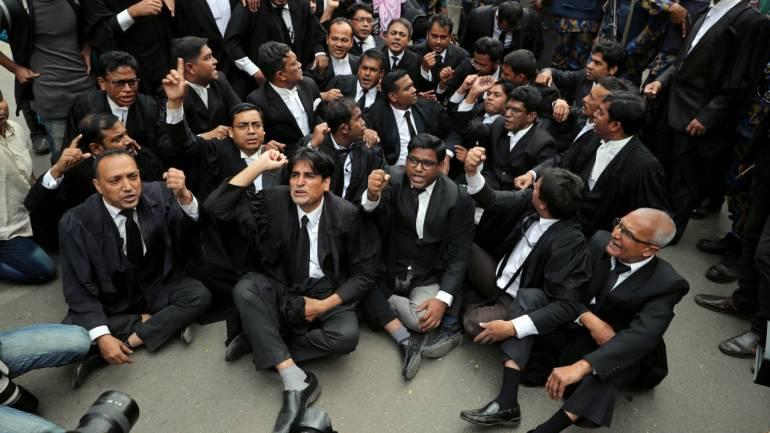Demand for Financial Aid for Lawyers, Law Clerks Grows Louder

Representational Image. Image Courtesy: Money Control
New Delhi: The suspension of the regular functioning of courts following the COVID-19-induced countrywide lockdown since March 25, has not only brought sufferings for the litigating public, translating into hampered access to justice at large, but also causing undue economic hardship to lawyers and related staff.
Angry for being left out in the cold, the advocates say their repeated ‘pleas’ have now been replaced by urgent ‘demands’ from the government for some kind of financial aid to keep their home fires burning, as their incomes has evaporated in the past last months.
The protest was led by the All India Lawyers Association for Justice, a pan-India advocates’ body formed during the lockdown period in light of the “neglect” the lawyers’ faced at the hands of governments – both Central and states.
Protest demonstrations were held outside district courts following which memoranda were submitted to the national and state bar councils. In the national capital, a representation was made to Ravi Shankar Prasad, Union Minister of Law and Justice.
Clifton D Rozario, a Bengaluru-based advocate, who is also the convenor of the lawyers’ body, told Newsclick that the “limiting” circumstances of the juridical function across the country had threatened the livelihood of many lawyers.
“Majority of the advocates in the country depend on everyday hearings of the court for their income. This section mainly involves junior lawyers – who anyway used to live hand to mouth. They have been badly affected by the closure of courts,” he said.
It goes without saying, Rozario added, that the stopping of day-to-day matters has also put the survival of law clerks and their families into question.
Subsequent to the announcement of pandemic-triggered lockdown in March, courts of all levels across the country suspended normal functioning. While the Supreme Court and the High Courts continue to function, taking up only ‘urgent’ matters through video conferencing, district courts have found it difficult to switch to the online system of ensuring justice. And this is when 95% of the country’s total lawyer population reportedly practice in lower courts.
Many lawyers were forced to look for other sources of income, said Rozario, adding that many of them “ took up whatever was available, including street vending and weaving.”
Of all the lawyers, those belonging to the vulnerable sections, such as women, Scheduled castes, along with first generation practitioners, were “disproportionately affected”, said Maitreyi Krishnan, another Bengaluru-based advocate.
In this backdrop, the a lawyers’ association has put forth a demand of monthly financial assistance of at least Rs 30,000 for both lawyers and law clerks, along with no-interest loans worth up to Rs 3 lakh.
Similar assistance had also been sought earlier by the Bar Council of India, the statutory body for regulation of the legal profession and education, which had approached Supreme Court, contending that 25-30% of advocates enrolled would be in need of immediate financial help. Taking note of it, the apex court had sought a response from the Centre and all bar associations on setting up a relief fund for lawyers.
In the meantime, several bar councils did set up funds to provide relief to out-of-work lawyers.
However, it is not only pandemic-induced challenges that are gripping the practitioners. With paper filing now being replaced with e-filing and notices being served through online modes, many are struggling to adjust with this shift as well.
Krishnan said the online system comes with its own limitations since many advocates do not have laptops and proper internet connections at home. As a consequence, she added, delayed hearings and backlogging of several cases are increasing.
Furthermore, “this holds grave concern for those accessing justice during the lockdown – especially when parliamentary processes are subverted and executives orders are passed. A judicial oversight is critical in such times,” Krishnan added.
Interestingly, Prashant Bhushan, a senior advocate, has been held guilty of contempt of court for his two tweets, in one of which he expressed his anguish at the non-physical functioning of the Supreme Court, which has resulted in the non-redressal of fundamental rights of citizens, especially the detainees.
Sharing his ordeal, Amit Kumar, 38, an advocate from Bihar’s Bhojpur, who practices in Ara Civil Court, said: “Since four months, I have been forced to take tuitions to earn only half of what I used to earn earlier.” His story sums up the state of hundreds of others like him practicing in lower courts.
“Only 10-20 lawyers are able to continue with their practice here [at Ara Civil Court], out of the 3,000 registered advocates, among whom as many as 1,200 were regular practitioners before the lockdown was imposed,” Kumar told Newsclick over the phone, adding that “We don’t have laptops, nor do we know how to file cases through online mode”.
Get the latest reports & analysis with people's perspective on Protests, movements & deep analytical videos, discussions of the current affairs in your Telegram app. Subscribe to NewsClick's Telegram channel & get Real-Time updates on stories, as they get published on our website.
























